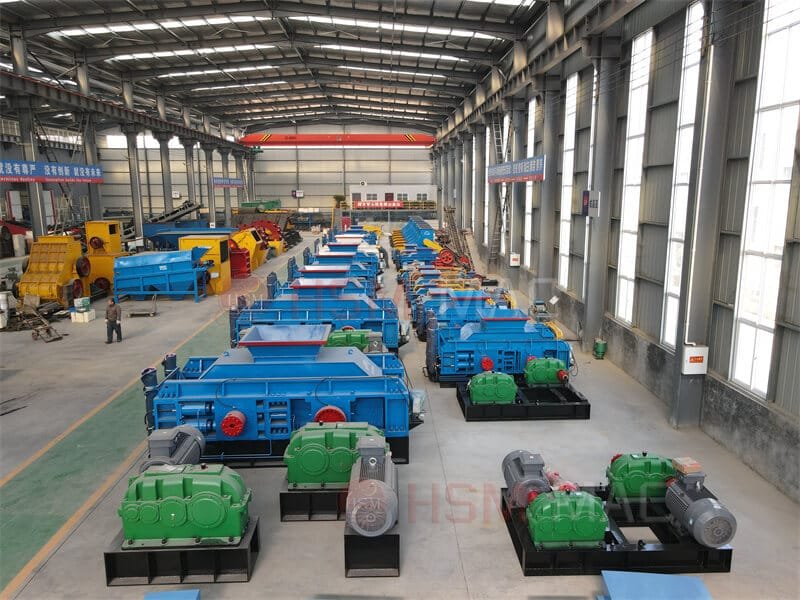Double Roll Crusher: Smooth Roll, Toothed Roll Maintenance Cycle
Maintenance of smooth and toothed rolls in a roll crusher requires targeted management based on equipment characteristics, material properties and operating procedures. The following are roll maintenance precautions and operating recommendations for roll crushers:

I. Smooth Roll Maintenance Cycle
- Daily Maintenance
- Lubrication Interval: Lubricate bearings with specialized grease at least once per week to reduce wear risks.
- Wear Inspection: Clean residual material from roll surfaces after each shift and check surface smoothness to prevent pitting or scratches that affect crushing performance.
- Scheduled Overhauls
- Roll Surface Replacement: Smooth rolls wear uniformly and typically require replacement every 6–12 months (depending on material hardness). For example, when processing high-hardness materials (e.g., iron ore), replace rolls immediately if diameter reduction exceeds 5–10% or cracks appear.
- Gap Adjustment: Check roller gaps every two weeks and adjust using springs or shims to maintain parallelism and prevent uneven wear.
- Major Overhaul Cycle
- Full disassembly, replacement of worn components, and equipment recalibration are required every 72 months.
II. Toothed Roll Maintenance Cycle
- High-Frequency Maintenance Tasks
- Tooth Plate Inspection: Check tooth plate wear every 1–3 months. Replace plates if tooth height loss exceeds 30% or fractures occur.
- Lubrication and Cleaning: Lubricate bearings monthly and replace grease annually; clean and oil chains weekly, with thorough cleaning monthly.
- Maintenance Tiered Cycles
- Minor Overhaul (12 months): Clear clogged material, inspect tooth plate wear, and replace safety pins.
- Medium Overhaul (36 months): Replace drive gears, adjust belt tension, and repair bearings.
- Major Overhaul (72 months): Disassemble and clean equipment, replace tooth roll shafts and plates, and repair the drive system.
- Adjustments for Special Conditions
- When processing high-hardness or abrasive materials (e.g., quartz sand), tooth plate lifespan may shorten to 2,000–3,000 hours (~3–4 months). Use high-chromium alloy materials to extend service life.
III. Key Factors Affecting Maintenance Cycles
- Material Properties: High-hardness or abrasive materials (e.g., iron ore) accelerate roll wear, necessitating shorter inspection intervals.
- Equipment Load: For continuous high-load operations (e.g., 24-hour runtime), increase lubrication and wear checks to daily.
- Maintenance Strategy: Predictive maintenance (e.g., sensors monitoring bearing temperature and vibration) enables early fault detection and optimizes replacement timing.
IV. Maintenance Recommendations
- Smooth Roll Optimization:
- Regularly clean adhered material to prevent localized wear.
- Use wear-resistant alloy roll surfaces (e.g., high-chromium cast iron) to extend lifespan beyond 1 year.
- Toothed Roll Protection:
- Install magnetic separators to prevent metal debris jams.
- Adjust spring pressure to balance crushing force and avoid overload-induced tooth plate fractures.
- Automation Upgrades:
- Deploy smart monitoring systems to trigger real-time alerts (e.g., bearing temperature >65°C) and reduce unplanned downtime.
Summary
- Smooth Rolls: Lubricate weekly, replace surfaces every 6–12 months, major overhaul at 72 months.
- Toothed Rolls: Inspect tooth plates every 1–3 months, minor overhaul at 12 months, major overhaul at 72 months; lifespan shortens to 3–4 months under high-hardness conditions.
- Critical Note: Actual cycles should be dynamically adjusted based on production intensity, material properties, and maintenance practices. Consult equipment manuals and manufacturers (e.g., Huashengming Heavy Machinery) for customized plans.
This translation maintains technical precision while ensuring clarity for global technical teams. Let me know if further refinements are needed!



